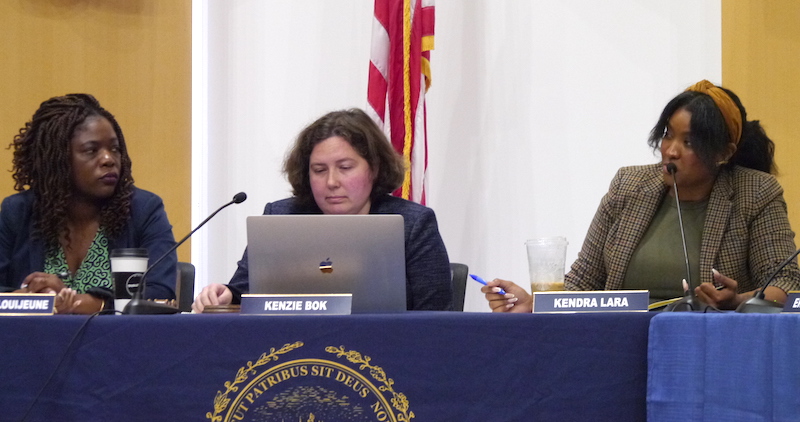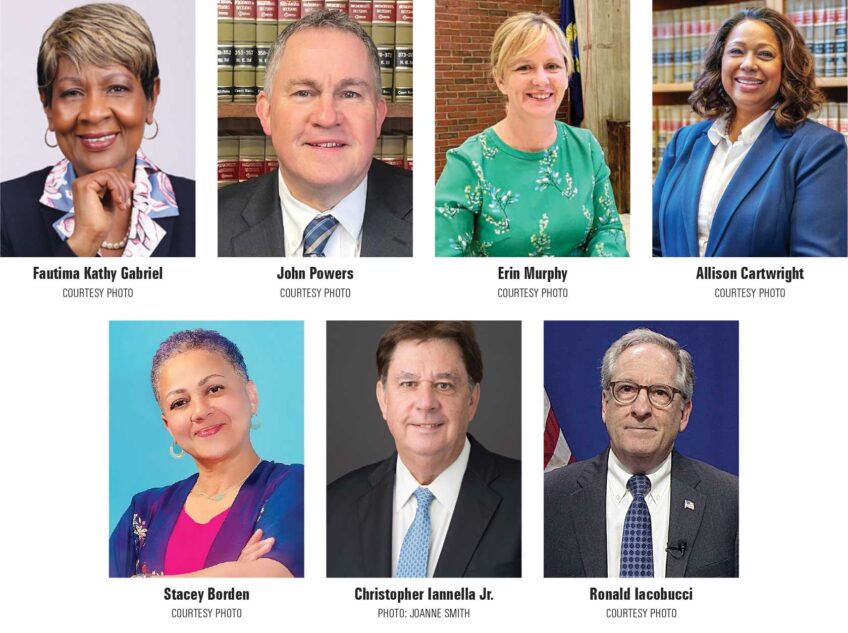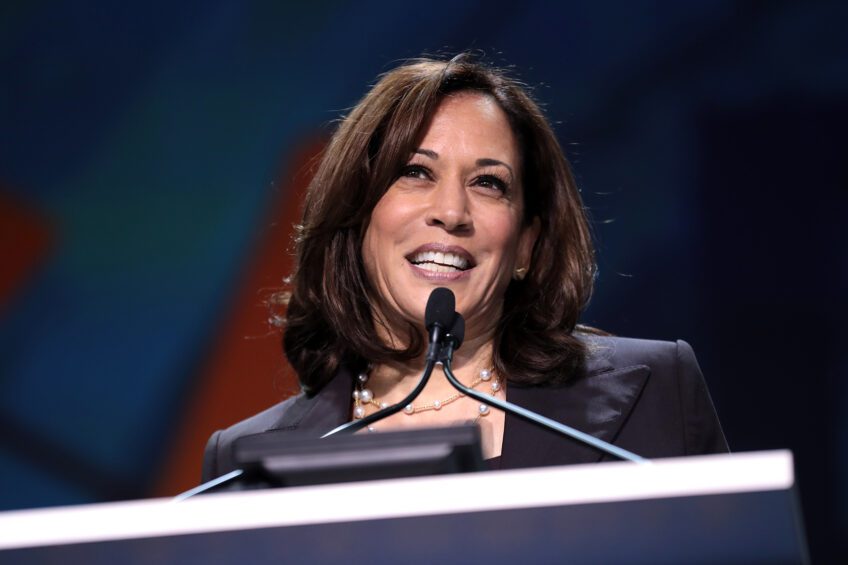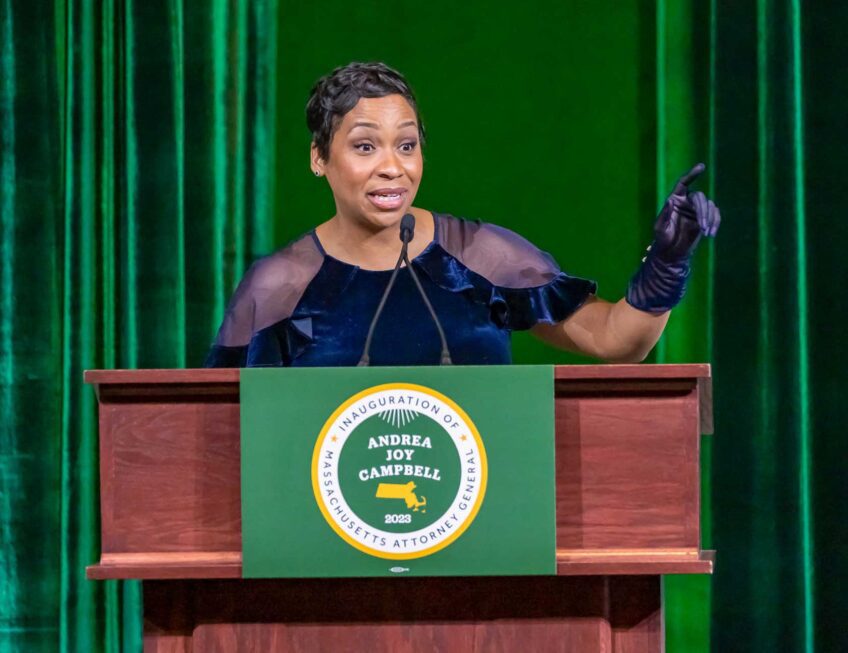Police, council clash over civilian flaggers
Cops won't give up positions they can't fill

A City Council hearing on the idea of using civilian flaggers instead of police details on some construction projects got heated Monday as Boston Police Patrolmen’s Association President Larry Calderone refused to surrender the microphone after exceeding the five-minute limit for testimony, prompting councilors to walk out of the hearing, held at the Bolling Building in Roxbury.
“We will accept written testimony at any length from anybody,” said Councilor Kenzie Bok, who chairs the City Services Committee. “There’s a bunch of people who are also waiting.”
Calderone, however, continued reading from a written statement in defense of maintaining the city’s prohibition on civilian flaggers.
“You claim to want to work together, but you get up and walk out of the room,” he said as Bok and Councilors Kendra Lara, Ruthzee Louijeune and Julia Mejia left the dais.
“This proposal will demolish a highly successful program that exists today,” he said as the councilors left the room. “Public safety details have documented proof of providing immediate responses to crimes, medical issues, traffic safety and violence.”
Lara had advanced the hearing order, which was backed by labor activists, to explore the use of civilians to direct traffic around construction projects and street work. Currently, only police can work such projects in Boston.
Labor activists said the job, which pays a state-mandated prevailing wage of $50.42 an hour, could benefit Boston residents, many of whom struggle to pay rent.
“You already have a salary you get for working for the Boston Police Department,” said anti-violence activist Romilda Pereira, addressing the police officers in the room. “On top of that, you get overtime. On top of that you get work as a flagger, and you’re not willing to share that?”
Tensions between the labor activists and police surfaced repeatedly throughout the hearing.
“You all are here like we’re at war with each other,” said activist Sashi James, addressing the police officers. “We’re just trying to figure out how do we bring the resources you all have into our communities.”
While police have a virtual monopoly on construction details, in the last year, police were only able to fill 65% of the details that companies requested from the city.
Superintendent Marcus Eddings testified that the details help the police better provide public safety, as they place on average 318 officers on the streets on details paid for by construction firms. He noted that officers can respond to police calls while on details, calling the arrangement a “value-added crime deterrent.”
Councilor Ricardo Arroyo asked Eddings whether the officers were on the details primarily to direct traffic or to deter crime, noting that if an officer responds to a call, they’re no longer able to direct traffic at a site.
“It can’t be both,” he said.
Arroyo also asked whether Eddings had read a 2015 operational audit of the department commissioned by the administration of former Mayor Martin Walsh. (He hadn’t). That report, Arroyo asserted, showed private firms owed the police department $24 million, $8 million of which was “uncollectible.” Because the department pays the detail officers before it collects the money from construction firms, Arroyo said, the detail program actually costs the city money.
Lara asked for the demographics of officers who work details. Eddings said he did not have that information.
“Details are not based on demographics,” he said.
“I would like to know,” Lara said.
Another issue councilors pressed the officers on is how projects are prioritized. Bok noted that major construction sites with pressing traffic needs are often unmanned while smaller projects have details assigned. Edding conceded that the department does not prioritize details based on the size or scope of the projects. While he testified that currently 35% of details go unfilled, the portion unfilled in the past year has been as high as 50%.
“We have to solve this problem,” Bok said. “We can’t be getting into situations where 30, 40, 50% of these details are going unfilled.”
Jascha Franklin-Hodge, the city’s chief of streets, noted that construction firms work directly with the police, preventing city officials from weighing in regularly on which details are filled. Also confounding any efforts at marshaling detail workers is the fact that officers decide which ones to work.
“Paid details are voluntary, not mandatory,” Eddings said.
Most of the councilors present appeared critical of the department’s management of and monopoly on details as well as the conduct of the officers present, as some of the officers repeatedly shouted at them while they spoke.
“When there’s an opportunity for change in Boston, there’s always an uproar,” Mejia said.
Councilor Tania Fernandes Anderson noted that the officers in the room, who were overwhelmingly white, were not representative of the city.
“When you look at this room, the demographics do not match the demographics in this city, and that’s troubling,” she said.
Calderone later challenged Fernandes Anderson on that point.
“This room is packed with 96, 97% police officers and workers. They reflect your community,” he said, urging the councilors to look around the room at the mostly-white gathering. At one point, Calderone rhetorically questioned whether Black officers were present among the 200-plus people in the hearing room. More than 20 stood up.
Councilors Ed Flynn, Frank Baker and Erin Murphy spoke in support of the police.
“The police officers in this city want what’s in the best interests of our neighborhoods,” Flynn said. “They have a longtime commitment to the city, and I think they want to make sure that we work together.”
Flynn said there aren’t enough officers on the streets and advocated hiring 400 new officers a year over the next 10 to 15 years.
Baker suggested that the number jobs currently open in City Hall points to a lack of demand for work such as flagging jobs.
“We should start looking at openings in the city before we look at details,” he said.
Murphy suggested that the high rate of pay for flaggers might actually deter Boston school children from attending college.
“My kids went to college,” she said. “I don’t know that they would have taken the path they took if they knew they could get a $70,000-a-year job out of high school.”
After the hearing Lara told the Banner that Calderone’s refusal to comply with Bok’s request to end his testimony was a “massive display of arrogance and entitlement.”
“I think it was disrespectful to the Boston City Council and the public process,” she said. “It should make everyone question the legitimacy of the Boston Police Patrolmen’s Association if this is the kind of leadership they have.”







